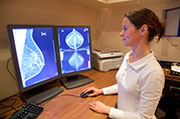- 7 Best Breads for Maintaining Stable Blood Sugar
- Gelatin vs. Collagen: Which is Best for Skin, Nails, and Joints?
- The Long-Term Effects of Daily Turmeric Supplements on Liver Health
- Could Your Grocery Store Meat Be Causing Recurring UTIs?
- Are You Making This Expensive Thermostat Error This Winter?
- Recognizing the Signs of Hypothyroidism
- 10 Strategies to Overcome Insomnia
- Could Artificial Sweeteners Be Aging the Brain Faster?
- Techniques for Soothing Your Nervous System
- Does the Water in Your House Smell Funny? Here’s Why
MRIs Before Breast Cancer Surgery on the Rise: Study


The use of MRI scans before breast cancer surgery has risen eightfold over the past decade, even though guidelines on their use in this setting are inconsistent, a new study shows.
This increased use of MRI — magnetic resonance imaging — is also linked to an increase in further testing, longer wait times to surgery, a higher likelihood of a mastectomy instead of breast-conserving surgery, and a higher likelihood of having the healthy, opposite breast removed, the Canadian researchers reported.
No guidelines support the routine use of preoperative MRI in women diagnosed with breast cancer, said lead researcher Dr. Matthew McInnes, of The Ottawa Hospital. Various organizations describe it as an optional procedure, as it can detect cancers that are missed with other tests.
In the study, the researchers examined numerous health care databases in the province of Ontario, and evaluated more than 53,000 women who had been diagnosed with operable breast cancer from 2003 through 2012.
In 2003, just 3 percent of patients had the preoperative MRI scan; by 2012, it was nearly 24 percent, the investigators found.
How many of those MRI scans weren’t needed?
“This is a tough question to answer,” McInnes said, citing inconsistent guidelines on the use of the technique. However, the same increase has been reported in the United States, he said, with researchers finding use of the procedure increasing anywhere from three to 20 times in recent years.
In the new study, published online Sept. 24 in the journal JAMA Oncology, McInnes and his team found that patients who had a preoperative MRI scan were younger, had higher incomes and were more likely to have other health problems.
In addition, those who had an MRI scan were more likely to undergo additional testing before their surgery, to have a mastectomy instead of a lumpectomy, and to have surgery to remove the opposite, healthy breast, the study found.
MRI scans are expensive, with costs varying greatly, McInnes said. MRI is about five or more times more expensive, for instance, than an ultrasound, he said.
Guidelines on when to perform preoperative MRI are inconsistent and confusing, agreed Dr. Constance Lehman, director of breast imaging at Massachusetts General Hospital in Boston, who co-authored an editorial accompanying the study.
“The only consistent guideline we have now is for screening of asymptomatic high-risk patients,” Lehman said. For instance, a woman with a strong family history of breast cancer would be offered a breast MRI in addition to mammography for routine testing, she said.
Among the limitations of the study, Lehman said, is that there is not information from the medical records used on whether the MRI results were positive or negative. So, the extent to which MRI affected treatment decisions is not clear, she said.
What’s needed, Lehman said, is not only consistent guidelines on the use of preoperative MRI, but more research on how to use the MRI results in guiding treatment.
For instance, if a woman with breast cancer is found to have two “quadrants” — or areas — with cancer, the typical recommendation is to have a mastectomy, she said. “If she had a pre-op MRI and two quadrants [were found to have cancer], it might be possible to have two small lumpectomies,” Lehman explained.
Dr. Habib Rahbar, of the University of Washington, Seattle, who co-wrote the editorial with Lehman, added, “It is important that we carefully consider how this powerful imaging tool can be used to provide more individualized and targeted therapies to women, rather than not use it altogether.”
Women considering a preoperative MRI should go to a facility and physician proficient in the technique, the experts agreed.
Lehman reports grant support from General Electric Healthcare and is a member of a research advisory board for GE Healthcare.
More information
To learn more about breast cancer, visit the American Cancer Society.
Source: HealthDay
Copyright © 2026 HealthDay. All rights reserved.










